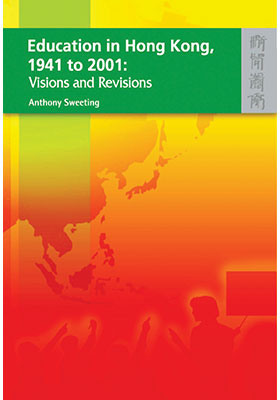Education in Hong Kong, 1941 to 2001
Visions and Revisions
(香港教育:1941–2001)
ISBN : 978-962-209-675-2
July 2004
700 pages, 6″ x 9″
- HK$350.00
Ebooks
This book is a sequel to Education in Hong Kong, Pre-1841 to 1941: Fact and Opinion (Hong Kong University Press, 1990).
It provides comprehensive coverage of developments in formal and informal education in Hong Kong from the end of 1941 to the beginning of the new millennium.
As was true of its predecessor, each Part of this book is subdivided into three sections: Commentary, Chronicle, and Evidence. Such an organization facilitates flexible reading. Readers primarily interested in analysis, interpretation, and the identification of themes are likely to focus initially on the Commentary sections and to move, as they feel stimulated, to the relevant entries in the Chronicle and/or items of Evidence. Readers who seek either more encyclopedic understanding or detailed answers to specific questions may well wish to focus primarily or at least initially on the Chronicle sections, and then to search for substantiation in the Evidence section or for amplification in the author’s Commentary. At times, some readers may wish to browse through the Evidence sections, reaching possibly serendipitous discoveries. Academic and general readers are likely to be particularly interested in Part I of the book, which deals with education in Hong Kong during the Japanese occupation, a topic that has received only very rare and generalization-bound treatment in other publications.
The author offers insights into all levels of education. His conceptual scope incorporates many types of education–including the mainstream academic education, technical education, teacher education, special education, physical education, civic education, education that focuses on morals, that which focuses on culture, and the various sorts of non-formal and informal education.
“Professor Sweeting’s second volume on education in Hong Kong continues to make compelling reading. Covering the period from the Second World War to the early years of the HKSAR, it presents, for the first time, a truly comprehensive account of the development of education. Rich in historical evidence and insightful analysis, it is a ‘must’ for serious students of education as well as general readers who want to know where we are in education today and how we have got here.” —Li Yuet-ting, Director of Education 1987–1992
“This is a sequel to the earlier volume that covered the period up to 1942. As with that volume, Professor Sweeting has provided those with an interest in the history of education in Hong Kong an invaluable resource. The chronologically based commentary and the wide range of source materials provide a fascinating and very vivid insight into the past. At a time when educational policies and events are at the forefront of public debate, this book provides a salient reminder of the value of understanding the past.” —Paul Morris, President, Hong Kong Institute of Education
“Tony Sweeting’s book provides a blow-by-blow account of the events unfolding in Hong Kong education from Japanese occupation to post-colonial era. As well as his own overview, it brings together key accounts, including first-hand interviews from the major players shaping change, extracts from crucial policy reports and the story as told in the media. It will be an invaluable companion for anyone interested in the moulding of our schools and universities.” —Katherine Forestier, Education Editor, South China Morning Post
“This book is an excellent sequel to its predecessor of the same title by the author. Together with the earlier volume, it provides a solid documentary base for any discussion of Hong Kong education.” —David Faure, University Lecturer in Modern Chinese History, Oxford University




